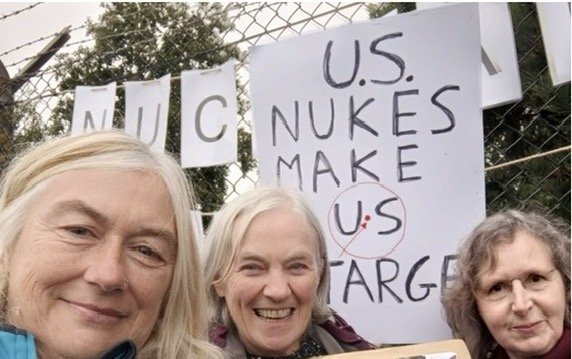By Christine Shawcroft, London CND Vice Chair
The Doomsday Clock, set by the Bulletin of the Atomic Scientists, has been moved on from 90 seconds to midnight last year to 89 seconds to midnight this year. Need we be worried about being a mere one second closer to catastrophe? Well, yes. 90 seconds was a warning of imminent disaster which should have spurred governments around the world to take drastic action. But they didn’t, so now we’re staring the destruction of human ‘civilisation’ (I use the term advisedly) in the face.
Apart from the real risks of nuclear war, the Bulletin scientists are very concerned about climate change, the potential misuse of biological science, and a variety of emerging technologies, such as AI weapons which could decide to kill and destroy without orders from a human. The world has never been so close to catastrophe, point out members of the Science and Security Board that set the Clock in consultation with the Bulletin’s Board of Sponsors, which includes nine winners of the Nobel prize.
The Bulletin itself was set up in 1945 by Albert Einstein, Robert Oppenheimer and University of Chicago scientists who worked on the Manhattan Project during World War Two. The Doomsday Clock was set up two years later. Clearly, world leaders feel that they can safely ignore the musings of intellectual dullards such as Einstein. Maybe they think they know better?
The people of Britain aren’t so sure. A recent YouGov poll, carried out at the end of January, shows that two thirds of us feel that nuclear war is the threat most likely to cause human extinction, up from just over 50% in 2023. The polling is remarkably consistent, with groups scoring within a couple of percentage points of each other regardless of age, gender, social class, country and region.
Concerns of nuclear war has risen since the outbreak of the war in Ukraine
People aged 50 to 64 are slightly less likely to think nuclear war will see us off, but that’s because a large proportion of them are equally worried about climate change or another pandemic (respondents could choose up to three threats).
People in London are almost as worried by climate change as the threat of nuclear war, yet when the bombs begin to fall large cities will be the first targets.
Reform UK voters are very worried about nuclear war, but think an asteroid strike is more likely than climate change!
War and climate change are closely linked. The carbon bootprint of military action is immense. In a nuclear war the detonation of just 50 warheads (which would be a very limited nuclear war indeed: this country has over 240 warheads and wants to increase them to nearer 300. The USA and Russia have several thousand each) would lead to a nuclear winter in which the skies would darken, there would be freezing temperatures leading to the deaths of farm animals, and the destruction of food crops. The people lucky enough (or unlucky enough?) to escape the first bombs would starve to death.
We have to change the direction of government policies, or next year we will be to nuclear midnight than ever…
Image credit: YouGov







